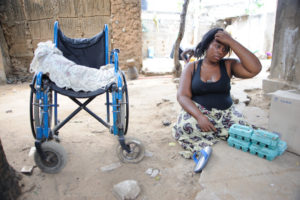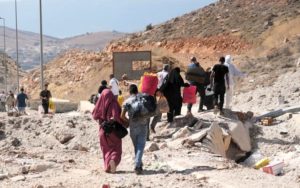In recent weeks, many thousands of Afghan refugees have been forcibly repatriated from Pakistan, while Egypt’s border has been closed to prevent the arrival of Palestinians from Gaza. In Bangladesh, 1 million Rohingya refugees from Myanmar live an increasingly precarious existence, unable to settle in the country or go back to their homes. Meanwhile, the UK government has been making intense efforts to implement an agreement that would allow newly arrived asylum seekers to be deported to Rwanda.
As these examples suggest, refugees around the world are not accessing the protection, solutions and assistance to which they are entitled. The second Global Refugee Forum (GRF) will seek to address this issue, with hundreds of delegates from the international aid sector meeting in Geneva in mid-December 2023.
The Forum builds on the Global Compact on Refugees (GCR), an agreement in December 2019, which sought to provide a framework for more predictable and equitable responsibility-sharing, recognizing that a sustainable solution to refugee situations cannot be achieved without international cooperation.
The Global Refugee Forum will now assess the implementation of the GCR, and shape the next four-year agenda of the refugee regime. While the chief of the United Nations Refugee Agency (UNHCR), Filippo Grandi, described the 2019 gathering as ‘a game changer’ and ‘a milestone for global solidarity and refugee protection’ four years on, does the GRF warrant such accolades? Or does its second meeting run the risk of becoming an expensive (and carbon-generating) talk shop, despite the efforts that UNHCR has made to maximise its outcomes?
Constraints and limitations
The impact of the Forum seems likely to be constrained by two principal factors: the limitations of the GCR itself, and an international environment that is increasingly hostile to the principles of refugee protection.
While the GCR succeeded in building a broad international consensus around the continued legitimacy of the international refugee regime, it was lacking in other respects. The GCR is a non-binding document, allowing signatory states to endorse its provisions in principle while ignoring or violating them in practice. While it is relatively strong on the need to provide more effective humanitarian and development assistance to refugees and refugee-hosting countries in the Global South, the GCR is much more reticent on the asylum obligations of states in the Global North and has little to say about key protection issues such as the right to seek asylum, non-refoulement, and search and rescue at sea.
Originally intended to be a global compact on responsibility-sharing, the document places no specific or measurable obligations on states in this respect. Moreover, in its failure to address the issue of externalisation, it effectively gives a green light to prosperous and powerful states that are determined to pursue policies such as interception and forced return, offshore processing, and the establishment of inter-state deals that confine refugees to poorer parts of the world.
Despite being lauded by UNHCR for their innovative nature, the GCR and its accompanying plan of action, the Comprehensive Refugee Response Framework (CRRF), are actually conservative in their approach. They completely exclude internally displaced populations, despite the fact that their numbers are higher and have increased much more quickly than refugees’. An entirely separate global compact was established in relation to migration, despite the growing phenomenon of ‘mixed movements’ involving refugees and other people who are on the move.
Contrary to the claims often made on its behalf, the CRRF contains little that is new, and in many respects constitutes a repackaging of ideas that have been on the table for years or even decades. For example, engaging development actors more thoroughly and at an earlier stage in refugee responses; enabling refugees to establish livelihoods, rather than becoming reliant on long-term assistance programmes; and providing better support to refugee-hosting communities.
Another limitation of these initiatives is to be found in the pledging system established for the GCR and CRRF, which enables states and other stakeholders to make specific commitments in relation to the objectives of the two documents. This system has provided a useful framework for those actors to apply the principles of the GCR and to mobilise the resources needed for this. It has also provided a convenient means for UNHCR to showcase and quantify the efforts being made to implement the GCR.
But it has also raised some important questions. To what extent have existing programmes, projects and spending commitments simply been repackaged as ’pledges’ for the sake of the Forum? Do the pledges made at and reported to the Forum prioritise the needs and aspirations of refugees themselves? And while UNHCR systematically reports on the number and proportion of pledges that have been ‘fulfilled’, should their outcomes and impact not be subjected to a more rigorous form of evaluation? To this end, the UNHCR has requested all pledges at the Global Refugee Forum be realistic, forward-looking and action-oriented. The impact of such pledges – and commitment to them – remain to be seen over the next four years.
Hostile environment
Above and beyond their inherent limitations, these global initiatives have been introduced at a time when the international environment for refugee protection, solutions and assistance has become increasingly hostile.
The UN Security Council, established to maintain peace throughout the world – thereby preventing and resolving refugee situations – has become highly dysfunctional, unable to take decisive action in relation to the crises in Ethiopia, Gaza and Myanmar, to name but a few. A number of the world’s most influential states (e.g., China, India, Israel, Russia and Turkey) are pursuing nationalistic and unilateralist policies that run counter to the principles of international cooperation and global governance on which the international refugee system is based. And this trend will be exacerbated if Donald Trump regains the United States presidency in the 2024 election.
Violent actors with no respect for human rights or international humanitarian law have been fuelling conflict and displacement in many parts of the world. These include the military junta in Myanmar, the Ethiopian army in Tigray, the competing armed forces in Sudan, extremist groups in Africa and the Middle East, as well as criminal cartels in the Americas. The mass movements generated by such actors have placed the international refugee protection and humanitarian relief systems under growing strain.
In the four years since the last GRF was held, other global trends have reinforced the hostility of the international environment to the objectives of the GCR. The Covid-19 pandemic, which was declared by the World Health Organization just a month after the first meeting of the GRF, prompted states to close their borders to asylum seekers, cut their refugee resettlement programmes, and divert resources from established refugee and humanitarian programmes.
While its precise impact on the scale and nature of human displacement remains a topic of great debate, the climate crisis is complicating the task of defining refugees and providing them and their host communities with adequate support. Surprisingly, people uprooted by environmental degradation and disaster fall largely outside the remit of the GCR, an omission that some states and civil society representatives are certain to contest at the Global Refugee Forum.
Realistic expectations
At the time of its establishment, a senior UNHCR staff member described the Global Compact on Refugees as a ‘minor miracle’. It was a reasonable comment to make, given that it was endorsed by the vast majority of UN member states and actively opposed by very few, despite the controversial nature of the refugee and asylum issues.
But endorsement and implementation are two very different matters, and there is no doubt that such early enthusiastic appraisals of the GCR and GRF were premature. In that respect, it is interesting to note the far more cautious tone of a report prepared by UNHCR for the Forum meeting:
Much more work is needed to truly make the GCR and its objectives a reality. Our gains, while important, have sometimes been slow or uneven. Burden and responsibility-sharing for hosting refugees and providing solutions regrettably remains inequitable.
As this statement suggests, there is now a need to recognise that the high expectations generated by the GCR have not been met, partly because of their inherent limitations, and also as a result of some profoundly negative trends in the international environment. At the same time, we must acknowledge that a UN mega-meeting such as the GRF will be very limited in its ability to overcome such constraints.
Even so, the Global Refugee Forum could serve some valuable purposes. It could help to hold the world’s most prosperous states to account for the weak example they are currently setting in relation to their commitment to refugee protection and responsibility-sharing. It can provide an important platform for refugees and refugee- led organisations, whose voices have been increasingly heard, and have grown over the past four years alongside their visibility to express their aspirations, demands and shape more impactful refugee responses – yet they remain chronically underfunded.
And beyond the inevitable formality of the Forum itself, the Geneva gathering provides an opportunity for delegates to share ideas, exchange experiences – to air, and perhaps even reconcile, their differences.
Originally published on the ODI blog (link here), on 6th December 2023. Republished here with the kind permission of the authors. The views in the article are the authors’ own, and might not reflect the views of UAI as a group.
Dr. Jeff Crisp was previously Head of Evaluation and Policy Development at UNHCR and now volunteers for United Against Inhumanity.
Amanda Gray Meral is a Research Fellow at the ODI Group. Her full profile is available here.











